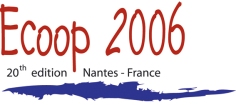Eclipse ( www.eclipse.org) is an open source community
whose projects are focused on providing an extensible development platform and application frameworks for building software.
You are invited to participate in the Eclipse Technology Exchange Workshop at ECOOP 2006, a workshop designed to provide an
opportunity for open exchange on Eclipse-based projects and extensions in industry, research and education.
Topics of Interest
The purpose of the eTX at ECOOP 2006 is to explore recent applications of the Eclipse platform in industry, research and education.
Topics for the workshop include, but are not limited to:
- Software Engineering education and research
- Using Eclipse in teaching object-oriented programming
- Courseware applications using the Rich Client Platform (RCP)
- Design requirements/specification tools
- Modeling environments and frameworks
- IDEs supporting the software development process
- Testing and debugging
- Program analysis and transformation (refactoring, optimization, obfuscation, reverse engineering...)
- Aspect Oriented Programming
- Rich Client Applications
- Service Oriented Architecture (SOA) applications
Workshop Format
The goal of the Eclipse Technology Exchange workshop is to create opportunities for participants to become familiar with each
other's work and to create a challenging environment for open exchange among participants. The workshop organization is inspired
by the LAWST (Los Altos Workshop on Software Testing) format, focusing on live discussion and collaboratively generating
conclusions, recommendations, and ideas rather than a publication quality proceedings.
There are four parts to our format:
- All workshop participants are expected to be active participants and all participants start by submitting a position paper for review
by the Program Committee. Position papers can vary in length from one or two pages to fully developed journal length discussions.
Positions papers are not required to be original, but they are needed to describe each participants interests, experiences, and research
areas. All position papers will be available on the workshop website as soon as they are submitted.
Note: everyone must submit a position paper in order to participate in the workshop, even the organizers and program committee.
Requiring position papers from everyone ensures that all participants will have a clear idea of what the other participants are working
on, interested in, and want to talk about.
- A few days before the workshop, the Program Committee will group the papers into between four and six sessions based around
common topics.
- At the workshop day, the sessions will occur consecutively. Each session will start with a presentation by selected authors from
the topic group. These presentations are not slick PowerPoint, but rather more of an interactive talk: the author will describe his or
her experiences, ideas, difficulties, and so on. A couple powerpoint slides or, better yet, a demo, are acceptable, but the key here is that
this is a workshop - an interactive conversation - not a lecture. In general, the talk should be about successes and future successes,
but instructive failures are also welcome. After the war stories, there is general discussion between the audience and the speakers - the
key feature of the discussion is that it stays focused on the speakers' points (the discussion topic) and does not devolve into each
audience member giving a short speech about his or her own ideas.
This discussion format is designed to maximize the interaction and two-way discussion about the topic area. All workshop
participants with experience in, or ideas about, the topic area become involved in the discussions.
- The key points, recommendations, practices and conclusions from the discussions will be summarized by a scribe and will be
made available to all participants via the workshop website. These notes are free to be referenced so long as the workshop is
acknowledged. Participants will have the option to include their position papers by either hosting their papers on the workshop site
or linking to their own from the workshop notes.
Proposal Submission
Potential participants must submit a position paper to the workshop committee. Submissions should include the author(s)
name, affiliation, phone and e-mail address, and the position paper. Please submit position papers in .pdf format. The authors of
accepted submissions will be invited to participate in the workshop.
Please, send your position papers to this email address.
Important Dates
| Proposal deadline: | |
Monday, May 15th, 2006  |
| Notification of acceptance: | |
Monday, May 22nd, 2006 |
| Final papers due: | | Friday, June 16th, 2006 |
Workshop Organizers
Program Commitee
| Jean Bézivin, University of Nantes, France |
| Michael G. Burke, Thomas J. Watson Research Center, USA |
| Eliane Fourgeau, TNI-Software, France |
| Bjorn Freeman-Benson, Eclipse Foundation, USA |
| Chris Laffra, IBM Rational, USA |
| Mira Mezini, TU Darmstadt, Germany |
| Fred Rivard, Industrial Software Technology, France |
| Margaret-Anne Storey, University of Victoria, Canada |
| Gabriele Taentzer, Technical University of Berlin, Germany |
| Andreas Zeller, Saarland University, Germany |
Registering for ECOOP 2006
All accepted participants must register for ECOOP 2006.
You may register for Workshop Only or for as a Regular Attendee which includes the workshops.
Previous related workshops
|


